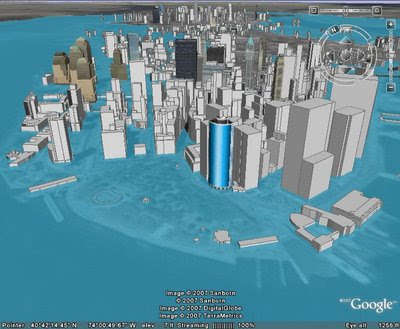
One of the most controversial areas of climate science is how high the seas are likely to rise in a warmer world. Last year, a report by the Intergovernmental Panel on Climate Change (IPCC) said that sea levels would rise by 15-59cm this century, an average of 38.5cm.
Climate sceptics said the figures were proof that the panel was downgrading the risk, as an IPCC report in 2001 had predicted 48.5cm.
Rajendra Pachauri, who chairs the IPCC, said: “Some are raising the [sea level] issue as being far more alarming than we had projected, but in the synthesis report we clearly said that we didn’t know enough and therefore we can’t place an upper limit on sea level rise this century.”
The uncertainty derives from how the Earth’s giant ice sheets will react to warmer temperatures. Of far more significance is the vast amount of water locked in the ice sheets of the polar regions.
The Greenland ice sheet and the West Antarctic ice sheet would together raise sea levels 12 metres if they were to melt. The East Antarctic ice sheet holds enough water to raise sea levels 50-60 metres, but is thought to be more resistant to global warming. Several hundred thousand small glaciers could also contribute.
The question is how quickly all that ice could crumble into the sea as global warming takes hold. Measurements on the ground and from space suggest the Greenland melt is accelerating, though scientists have struggled to recreate the process in computer models, which makes projections difficult.
In September, a team led by Tad Pfeffer at the University of Colorado at Boulder, published calculations using conservative, medium and extreme glaciological assumptions for sea rise expected from Greenland, Antarctica and the world’s smaller glaciers and ice caps.
They concluded the most plausible scenario, when factoring in thermal expansion due to warming waters, will lead to a total sea level rise of roughly 100-200cm by 2100.
Jim Hansen, of Nasa, has argued that most estimates of sea level rise are too conservative. He says that feedbacks in the climate system would accelerate ice melt, and lead to collapse. — Guardian Newspapers Limited 2008
Climate sceptics said the figures were proof that the panel was downgrading the risk, as an IPCC report in 2001 had predicted 48.5cm.
Rajendra Pachauri, who chairs the IPCC, said: “Some are raising the [sea level] issue as being far more alarming than we had projected, but in the synthesis report we clearly said that we didn’t know enough and therefore we can’t place an upper limit on sea level rise this century.”
The uncertainty derives from how the Earth’s giant ice sheets will react to warmer temperatures. Of far more significance is the vast amount of water locked in the ice sheets of the polar regions.
The Greenland ice sheet and the West Antarctic ice sheet would together raise sea levels 12 metres if they were to melt. The East Antarctic ice sheet holds enough water to raise sea levels 50-60 metres, but is thought to be more resistant to global warming. Several hundred thousand small glaciers could also contribute.

The question is how quickly all that ice could crumble into the sea as global warming takes hold. Measurements on the ground and from space suggest the Greenland melt is accelerating, though scientists have struggled to recreate the process in computer models, which makes projections difficult.
In September, a team led by Tad Pfeffer at the University of Colorado at Boulder, published calculations using conservative, medium and extreme glaciological assumptions for sea rise expected from Greenland, Antarctica and the world’s smaller glaciers and ice caps.
They concluded the most plausible scenario, when factoring in thermal expansion due to warming waters, will lead to a total sea level rise of roughly 100-200cm by 2100.

Jim Hansen, of Nasa, has argued that most estimates of sea level rise are too conservative. He says that feedbacks in the climate system would accelerate ice melt, and lead to collapse. — Guardian Newspapers Limited 2008



No comments:
Post a Comment